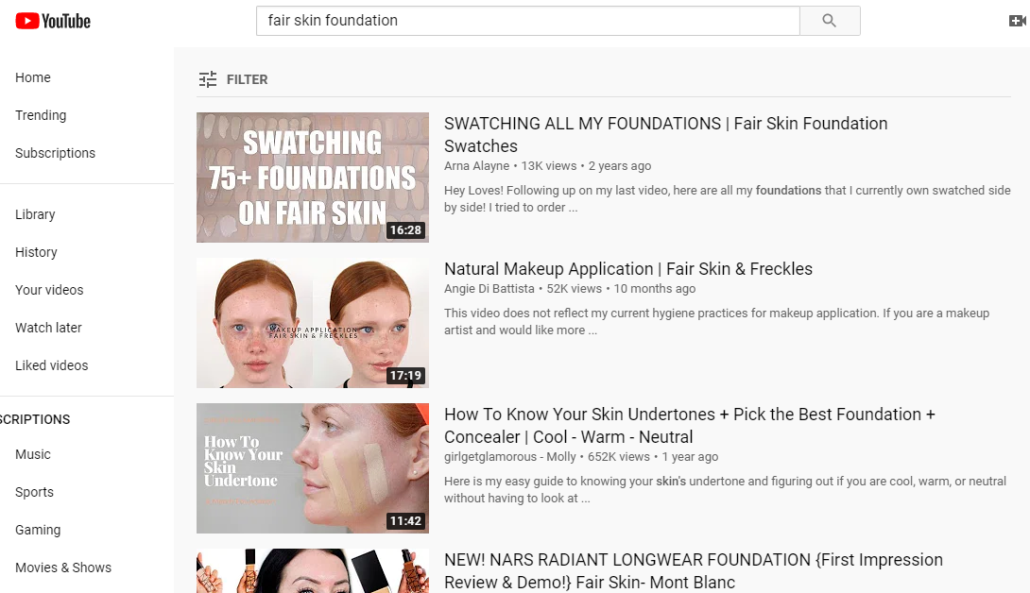Makeup in Black and White
A few weeks ago, the Black magazine Essence published an article titled, “A Group Of Black Women Discuss What It’s Like To Shop For Makeup At The Drugstore.” As a very pale White woman, I have always struggled to find makeup that matches my complexion — drugstore or high-end. Makeup artists have jokingly suggested Wite-Out to me multiple times when I have asked for concealer recommendations. I was curious to hear if my experiences were similar to those of the women Essence spoke to.
For those who don’t know, foundation and concealer are powder or liquid makeup products used to create an even, flawless base that matches the user’s skin.

In the article’s video, “Black-Girl Approved: Foundations,” four female Essence staffers sample a table full of foundations to find their perfect match. They rule out options that are too light or too dark. Essence claims “drugstore makeup brands typically fall short of meeting the basic needs of Black beauty consumers: a true match foundation that doesn’t skim [sic] on quality. . . . The shade range is vexingly shallow.”
If it weren’t for that, this video would be a generic product review based on the needs of a certain consumer group. However, no equivalent content or consumer efforts exist for very fair women. Even though foundation reviews for “fair,” “pale,” or “very fair” skin tones exist on platforms such as YouTube, no major publication references the miniscule pale shade range commonly available at drugstores as “vexingly shallow.”


A search for makeup inclusivity regarding pale skin shows a 2017 story picked up by several mainstream outlets — Allure, Teen Vogue, and Glamour Magazine among them — which celebrated Rihanna’s Fenty Beauty products for including such a wide range of foundation shade that an albino woman tweeted that she was able to find a match for her skin. Would every major beauty publication have picked up the story if a really pale woman without a genetic condition had successfully found a foundation? So far, the answer is “no.”
 Moreover, the albino woman reports on her personal Instagram page that she is, in fact, Black. So even reviews of light shades of makeup are about non-Whites.
Moreover, the albino woman reports on her personal Instagram page that she is, in fact, Black. So even reviews of light shades of makeup are about non-Whites.
The Essence article claims “that in 2020, there is still work to do to make the beauty community a place that is inclusive of all,” but she means retailers should listen to the concerns of “people of color” only.
- , by Tynan Sinks, Allure, November 10, 2018
- 10 Foundations that make women of color a priority, by Eden Mogese, The Everygirl, February 28, 2018
- Makeup Industry Veteran Discusses Why The Beauty Industry Continues To Fail Women Of Color, by Janice Gassam Asare, Forbes, March 12, 2020
- Discrimination at the Makeup Counter, by Karim Organe, HuffPost, November 12, 2011
These types of articles declare that makeup users of color are not merely inconvenienced but truly discriminated against and victimized in a way that White consumers are not. Despite clear evidence that shade matching is challenging across the skin tone spectrum, retailers and consumers alike are being told to believe that Black women are uniquely suffering because of phantom evils — unconscious bias and systemic racism.
If this were true, then I would be able to walk into any drugstore and consistently find an appropriate shade of foundation for my alabaster skin — something I have never been able to do in my entire life. Women of color seem to have the upper hand because fashion and beauty writers lobby, guilt, and shame retailers on their behalf.




